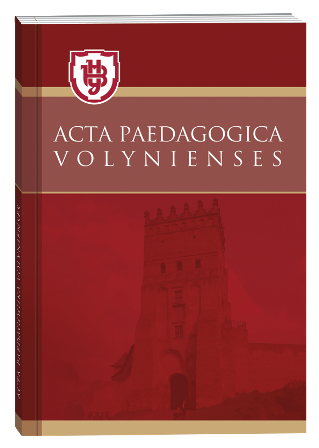CONTINUITY IN FORMING KEY PATTERNS ABOUT THE FLORA AT PRIMARY SCHOOL
DOI:
https://doi.org/10.32782/apv/2023.6.7Keywords:
continuity, plants, integrated course, competence, primary schoolchildren, native land, environmentAbstract
The article analyzes the state of development of the problem of continuity in the study about nature at primary school. It is analyzed that ensuring compliance with the principle of continuity in the process of studying the key concepts and patterns about the environment has a direct impact on the development of the personality of primary schoolchildren, the formation of their natural awareness. It is found out that focusing the education at primary school on plants, especially flowering ones, is quite reasonable, as this approach helps to form a system of integrated knowledge about nature, take into account the peculiarities of the psychophysiology of children and create comfortable conditions for their learning. The learning process on the example of flowering plants allows pupils to get as close as possible to the subject of study, using their own observations and research skills. It contributes to a better assimilation of the material and forms a positive attitude to learning. An important aspect is the use of didactic principles of continuity, visibility, accessibility and scientificity. The author of the article emphasizes that it is important to take into consideration the aspect of pupils’ everyday life, where plants play a significant role. This approach allows to build a connection between what is studied at school and real life situations. The scientific exploration states that students find it easier to perceive and assimilate new knowledge if they have some practical experience with the subject of study. The article focuses on the knowledge and skills of primary schoolchildren, which contribute to the development of research skills and abilities, instill ecological awareness, stimulate to explore the world. Given examples of exercises and didactic games improve the memorization and development of thinking of primary school children, deepen their knowledge about plants that surround them, nature and the environment.
References
Гораш К. В. Підготовка вчителів до забезпечення наступності у впровадженні реформ: початкова школа – гімназія. Матеріали Всеукраїнської науково-практичної конференції з міжнародною участю «Навчання через гру в освітньому просторі України: досвід, виклики, ідеї та рішення» (18–19 березня 2021 року, м. Запоріжжя) Випуск № 1(43). 2021.
Ковшар О. В. Роль принципів наступності і перспективності в організації безперервної освіти. Педагогіка вищої та середньої школи. Вип. 1. С. 176–185. URL: http://nbuv.gov.ua/UJRN/PVSSh_2017_1_22 (дата звернення: 13.12.2023).
Нова українська школа. Концептуальні засади реформування середньої школи. Концепція нової української школи. URL: https://www.kmu.gov.ua/storage/app/media/reforms/ukrainska-shkola-compressed.pdf (дата звернення: 13.12.2023).
Пометун О.І. Нова українська школа : розвиток критичного мислення учнів початкової школи : навч.-метод. посіб. Київ : Видавничий дім «Освіта», 2020. 192 с.
Савчин М. В., Василенко Л. П. Вікова психологія. Київ : Академвидав, 360 с.
Ушинський К. Д. Твори в 6-ти томах. Т. 2. Київ, 1954. 500 с.
Типові освітні програми Нової української школи для закладів загальної середньої освіти: 1–2 та 3–4 класи. Київ : «Світоч», 2019. 336 с.
Черненко Г. Особливості вивчення природознавства молодшими школярами в Україні (початок ХХІ століття – сьогодення). Науковий збірник «Актуальні питання гуманітарних наук: міжвузівський збірник науко-вих праць молодих вчених Дрогобицького державного педагогічного університету імені Івана Франка». Том 18. № 18. С. 184–192.







